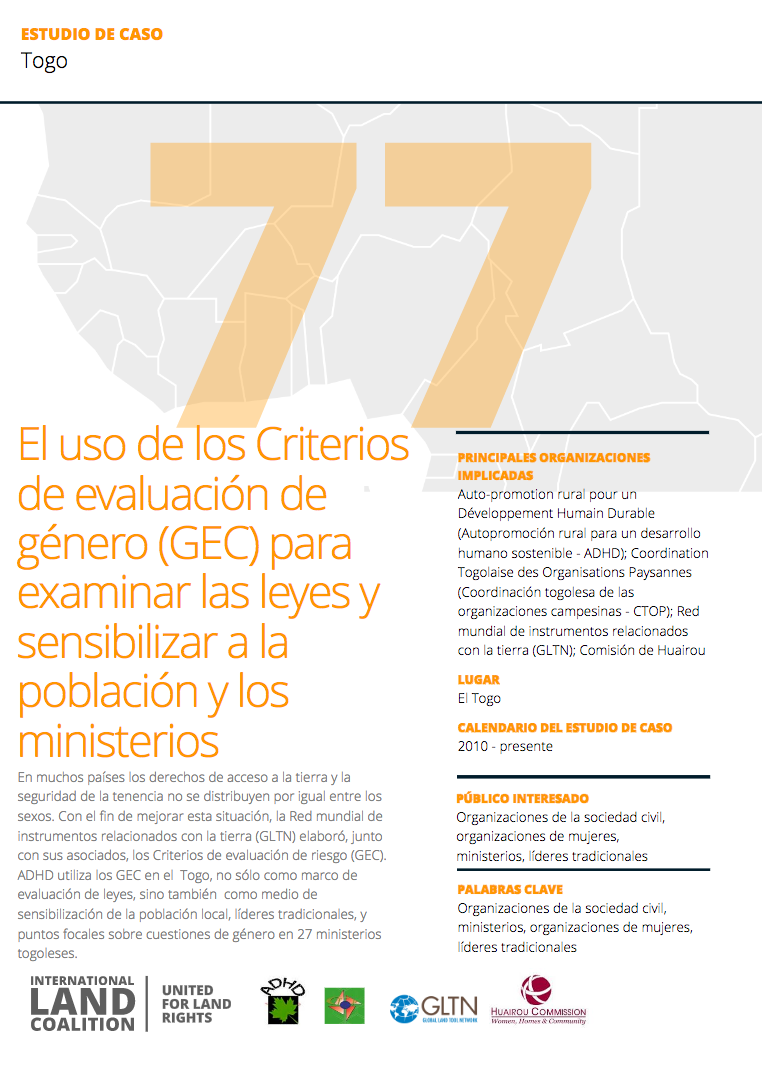Ley Orgánica de Tierras Rurales y Territorios Ancestrales.
La presente Ley Orgánica de Tierras Rurales y Territorios Ancestrales, tiene por objeto normar el uso y acceso a la propiedad de la tierra rural, el derecho a la propiedad de la misma que deberá cumplir la función social y la función ambiental.
Succession (Scotland) Act 2016 (2016 asp 7).
This Act provides rules concerning how property passes on a person‘s death. This includes reforms which relate to the rectification of wills; the effect of divorce, dissolution or annulment on a will or special destination; and the revival of a revoked will.
2. Strengthening Arab Women's Property Rights and Access to Land - Paper
Improving Women's Access to Land and Property in The Arab States: The Role Of Inheritance, Dower, and Marital Property
2. Strengthening Arab Women's Property Rights and Access to Land - PPT
Strengthening Arab Women's Property Rights and Access to Land - PPT
13. Land Rights from a Gender Perspective: Multi-stakeholder Actions to enhance Gender and Women Land Rights in Land Policy Formulation and Implementation in Uganda - Paper
Land Rights from a Gender Perspective: Multi-stakeholder Actions to enhance Gender and Women’s Land Rights in Land Policy Formulation and Implementation in Uganda
13. Land Rights from a Gender Perspective: Multi-stakeholder Actions to enhance Gender and Women Land Rights in Land Policy Formulation and Implementation in Uganda - PPT
Land Rights from a Gender Perspective: Multi-stakeholder Actions to enhance Gender and Women’s Land Rights in Land Policy Formulation and Implementation in Uganda
El uso de los Criterios de evaluación de género (GEC) para examinar las leyes y sensibilizar a la población y los ministerios
En muchos países los derechos de acceso a la tierra y la seguridad de la tenencia no se distribuyen por igual entre los sexos. Con el fin de mejorar esta situación, la Red mundial de instrumentos relacionados con la tierra (GLTN) elaboró, junto con sus asociados, los Criterios de evaluación de riesgo (GEC). ADHD utiliza los GEC en el Togo, no sólo como marco de
Capacity Assessment of Land Administration and Management in Bangladesh: Critical Reflections on Institutional Processes, Capabilities and Gaps
Capacity of local land administration has to be addressed for further strengthening the governance system with a view to deriving the benefits of socio-economic, political and cultural development for the common people of this country. It is true that in Bangladesh, voice in favour of effective land administration and management is becoming louder at the national level.
DEVELOPMENT AND IMPLEMENTATION OF THE LAND MANAGEMENT SYSTEM: AN IMPETUS OR A DETERRENT TO EFFECTIVE AND EFFICIENT LAND MANAGEMENT IN KENYA?
A Land Information Management System (LIMS) is an information system that enables the capture, management, and analysis of geographically referenced land-related data in order to produce land information for decision-making in land administration and management. The system is a Geospatial Information System (GIS) driven for the purposes of handling and managing parcel based information.
Gender Equitable Land Governance in Odisha, India: An analysis through VGGT-Gender Lens
This paper analyzes the state’s Land Governance in terms of the five themes for
administrators, technicians and professionals working in the land sector as per the gender-framework of FAO’s VGGT along with an additional theme on community perspectives on women land rights, and recommends strategies for moving towards it.
Mind the Gap
The 1995 Constitution of the Republic of Uganda is one of the most gender sensitive constitutions in the world, with clear provisions for promoting and protecting the rights of women. This is also the case in relation to women’s land rights – the Constitution clearly vests land in the people of Uganda, including the rights of women to own and inherit land.






